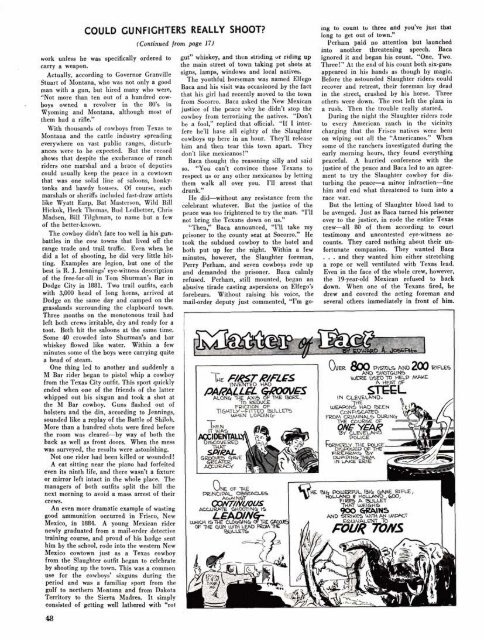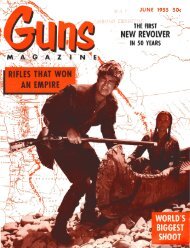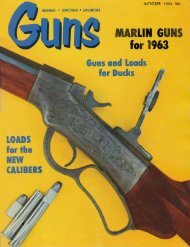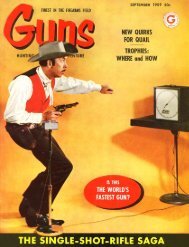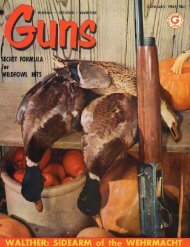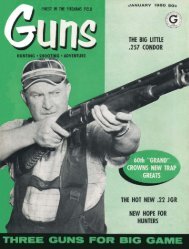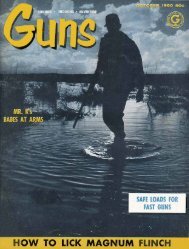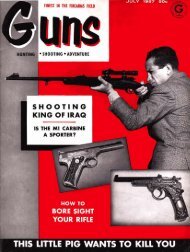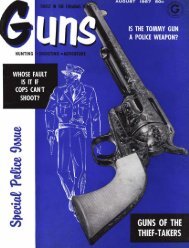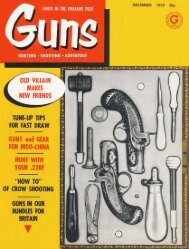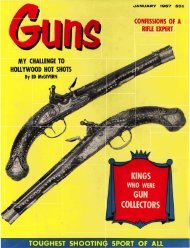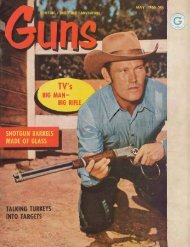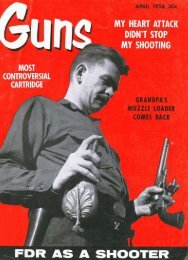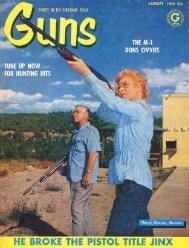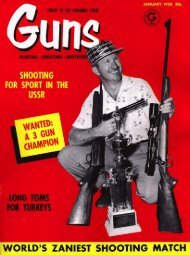Create successful ePaper yourself
Turn your PDF publications into a flip-book with our unique Google optimized e-Paper software.
COULD GUNFIGHTERS REALLY SHOOT?<br />
(Continued jrom page 17)<br />
work unless he was specifically ordered to<br />
carry a weapon.<br />
Actually, according to Governor Granville<br />
Stuart of Montana, who was not only a good<br />
man with a gun, but hired many who were,<br />
"Not more than ten out of a hundred cow-<br />
boys owned a revolver in the 80's in<br />
Wyoming and Montana, although most of<br />
them had a rifle."<br />
With thousands of cowboys from Texas to<br />
Montana and the cattle industry spreading<br />
everywhere on vast public ranges, disturb-<br />
ances were to be expected. But the record<br />
shows that despite the exuberance of ranch<br />
riders one marshal and a brace of deputies<br />
could usually keep the peace in a cowtown<br />
that was one solid line of saloons, honky-<br />
tonks and bawdy houses. Of course, such<br />
marshals or sheriffs included fast-draw artists<br />
like Wyatt Earp, Bat Masterson, Wild Bill<br />
Hickolt, Heck Thomas, Bud Ledbetter, Chris<br />
Madsen, Bill Tilghman, to name but a few<br />
of the better-known.<br />
The cowboy didn't fare too well in his gun-<br />
battles in the cow towns that lived off the<br />
range trade and trail traffic. Even when he<br />
did a lot of shooting, he did very little hit-<br />
ting. Examples are legion, but one of the<br />
best is R. J. Jennings' eye-witness description<br />
of the free-for-all in Tom Shurman's Bar in<br />
Dodge City in 1881. Two trail outfits, each<br />
with 3,000 head of long horns, arrived at<br />
Dodge on the same day and camped on the<br />
@asslands surrounding the clapboard town.<br />
Three months on the monotonous trail had<br />
left both crews irritable, dry and ready for a<br />
toot. Both hit the saloons at the same time.<br />
Some 40 crowded into Shurman's and ba~<br />
whiskey flowed like water. Within a few<br />
minutes some of the boys were carrying quite<br />
a head of steam.<br />
One thing led to another and suddenly a<br />
M Bar rider began to pistol whip a cowboy<br />
from the Texas City outfit. This sport quickly<br />
ended when one of the friends of the latter<br />
whipped out his sixgun and took a shot at<br />
the M Bar cowboy. Guns flashed out of<br />
holsters and the din, according to Jennings,<br />
sounded like a replay of the Battle of Shiloh.<br />
More than a hundred shots were fired before<br />
the room was cleared-by way of both the<br />
back as well as front doors. When the mess<br />
was surveyed, the results were astonishing.<br />
Not one rider had been killed or wounded!<br />
A cat sitting near the piano had forfeited<br />
even its ninth life, and there wasn't a fixture<br />
or mirror left intact in the whole place. The<br />
managers of both outfits split the bill the<br />
next morning to avoid a mass arrest of their<br />
crews.<br />
An even more dramatic example of wasting<br />
good ammunition occurred in Frisco, New<br />
Mexico, in 1884. A young Mexican rider<br />
newly graduated from a mail-order detective<br />
training course, and proud of his badge sent<br />
him by the school, rode into the western New<br />
Mexico cowtown just as a Texas cowboy<br />
from the Slaughter outfit began to celebrate<br />
by shooting up the town. This was a common<br />
use for the cowboys' sixguns during the<br />
period and was a familiar sport from the<br />
gulf to northern Montana and from Dakota<br />
Territory to the Sierra Madres. It simply<br />
consisted of getting well lathered with "rot<br />
48<br />
gut'' whiskey, and then striding vr riding up<br />
the main street of town taking pot shots at<br />
signs, lamps, windows and local natives.<br />
The ~outhful horseman was named Elfego<br />
Baca and his visit was occasioned by the fact<br />
that his girl had recently moved to the town<br />
from Socorro. Baca asked the New Mexican<br />
justice of the peace why he didn't stop the<br />
cowboy from terrorizing the natives. "Don't<br />
be a fool," replied that official. "If I interfere<br />
he'll have all eighty of the Slaughter<br />
cowboys up here in an hour. They'll release<br />
him and then tear this town apart. They<br />
don't like mexicanos!"<br />
Baca thought the reasoning silly and said<br />
so. "You can't convince those Texans to<br />
respect us or any other mexicanos by letting<br />
them walk all over you. I'll arrest that<br />
drunk."<br />
He did-without any resistance from the<br />
celebrant whatever. But the justice of the<br />
peace was too frightened to try the man. "I'l<br />
not bring the Texans down on us."<br />
"Then," Baca announced, "I'll take my<br />
prisoner to the county seat at Socorro." He<br />
took the subdued cowboy to the hotel and<br />
both put up for the night. Within a few<br />
minutes, however, the Slaughter foreman,<br />
Perry Perham, and seven cowboys rode up<br />
and demanded the prisoner. Baca calmly<br />
refused. Perham, still mounted, began an<br />
abusive tirade casting aspersions on Elfego's<br />
forebears. Without raising his voice, the<br />
mail-order deputy just commented, "I'm go-<br />
~ng<br />
to count t~ three and you've just that<br />
long to get out of towmW<br />
Perham paid no attention but launched<br />
into another threatening speech. Baca<br />
ignored it and began his count. "One. TWO.<br />
Three!" At the end of his count both six-guns<br />
appeared in his hands as though by magic.<br />
Before the astounded Slaughter riders could<br />
recover and retreat, their foreman lay dead<br />
in the street, crushed by his horse. Three<br />
others were down. The rest left the plaza in<br />
a rush. Then the trouble really started.<br />
During the night the Slaughter riders rode<br />
to every American ranch in the vicinity<br />
charging that the Frisco natives were bent<br />
on wiping out all the "Americanos." When<br />
some of the ranchers investigated during the<br />
early morning hours, they found everything<br />
peaceful. A hurried conference with the<br />
justice of the peace and Baca led to an agree-<br />
ment to try the Slaughter cowboy for dis-<br />
turbing the peacea minor infraction-fine<br />
him and end what threatened to turn into a<br />
race war.<br />
But the letting of Slaughter blood had to<br />
be avenged. Just as Baca turned his prisoner<br />
over to the justice, in rode the entire Texas<br />
crew-all 80 of them according to court<br />
testimony and uncontested eye-witness ac-<br />
counts. They cared nothing about their un-<br />
fortunate companion. They wanted Baca<br />
. . . and they wanted him either stretching<br />
a rope or well ventilated with Texas lead.<br />
Even in the face of the whole crew, however,<br />
the 19-year-old Mexican refused to back<br />
down. When one of the Texans fired, he<br />
drew and covered the acting foreman and<br />
several others immediately in front of him.


